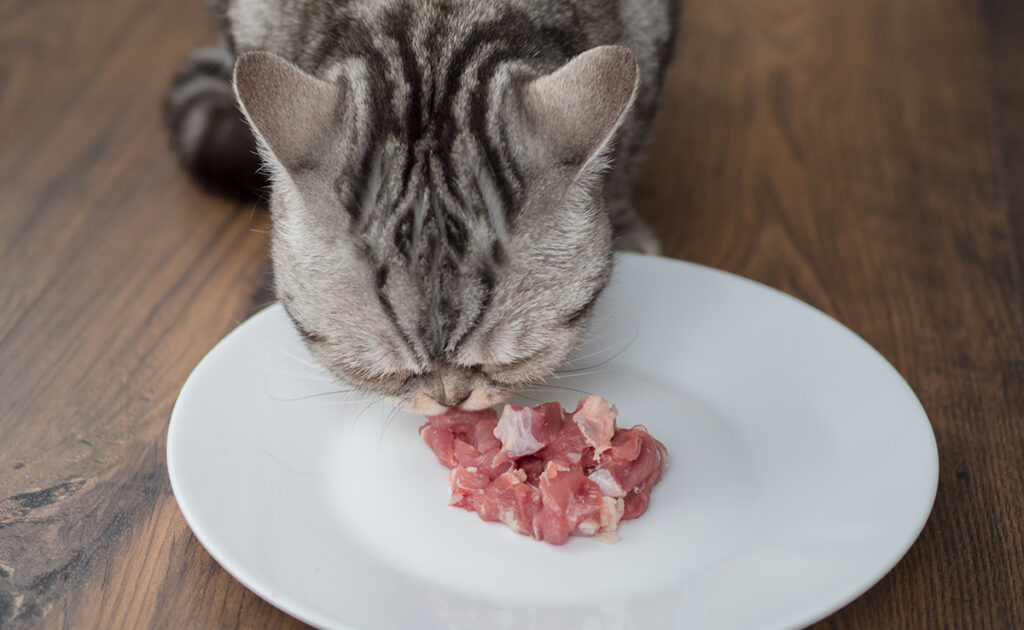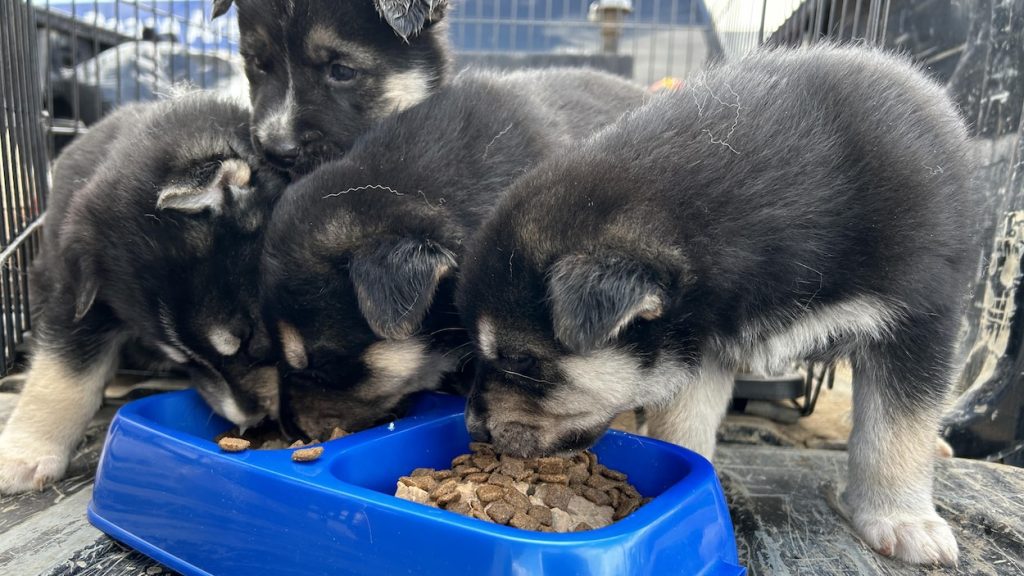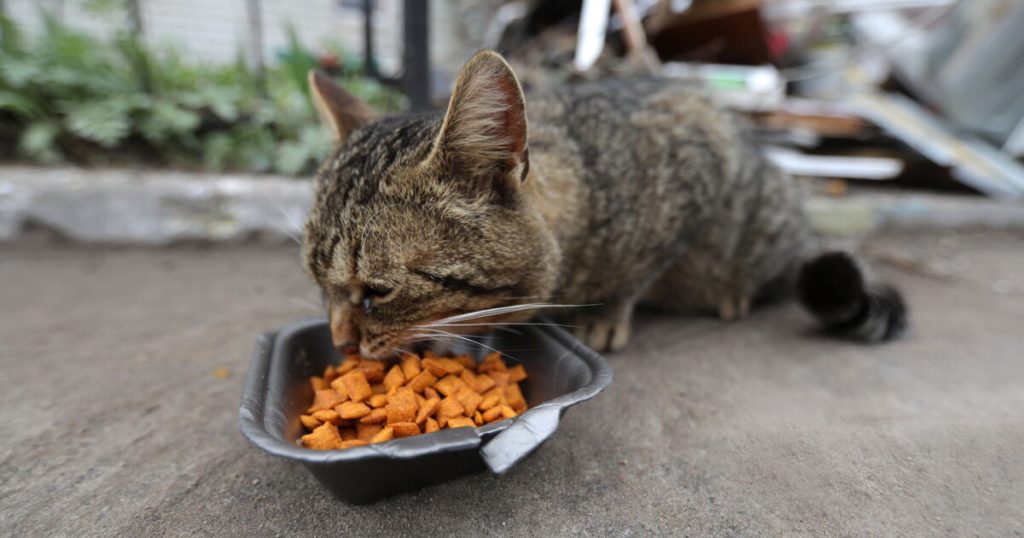
Carnivorous above all, the cat's diet often concerns the owner who wishes to provide quality food for his little companion. Since in the wild, our domestic cats rarely hesitate to hunt and sometimes consume their prey, the intake of raw meat may seem harmless. Is this natural diet really suitable for our felines? What are the advantages and disadvantages of consuming raw meat for the animal? What other dangers for the feline?
Raw meat: the most natural food for cats?
A mouse, or nothing!
We often compare the cat's daily ration to the ingestion of a prey such as a mouse. The latter contains all the nutrients necessary for the functioning of the body. The industrial components come as close as possible to the daily needs of your little companion:
- 50 to 60% meat proteins;
- 20 to 30% fat;
- 3 to 8% carbohydrates.
But in mice, carbohydrates come from the small mammal's diet, just like fiber. Without flour, without chemical or coloring agents, the mouse, rabbit or lizard meet the nutritional needs of the feline.
By opting for a diet based solely on meat, the owner gets closer to the feline's natural diet. However, raw chicken breasts, pieces of lamb or beef do not contain the fibers present in the stomachs of the small predator's prey. This so-called BARF diet must also offer artificial or natural vitamin and mineral supplements, and sometimes a little fruit and vegetables in small quantities.
An organism always adapted to wild life
Although felines have shared life with humans for thousands of years, your pet's digestive tract and microbiome have remained the same. Its intestinal flora remains capable of digesting raw foods and protecting it from various pathogenic organisms.
The bacteria and yeasts that line the cat's intestines protect against different bacteria or parasites. The mice, field mice, lizards or insects that your cat would consume if returned to the wild often harbor fewer germs than our processed raw meats, allowing the animal the best chance of survival. Above all, by feeding only on live and fresh prey, the little felines provide their body with all the essential nutrients and vitamins to maintain their immune defenses.
The advantages and disadvantages of raw meat for your pet
Feeding your cat raw meat or BARF would therefore have multiple benefits for its health.
The benefits of eating raw meat for your cat
- Quality essential nutrients that freshness preserves;
- The absence of flour or starch which our little companions simply do not digest;
- The absence of preservatives found in most dry or moist industrial foods.
You choose exactly the quality of the ingredients, and also their origin: muscles, offal or bones and the vitamins and trace elements to add. Advised by their veterinarian, cats who consume raw meat have better oral health, because their jaw and teeth are properly used to chew the food offered. The proteins which help to strengthen their immune system and reduce the risk of digestive pathologies are then correctly dosed for our little companions.
The constraints of raw food for the owner
Preparing your cat's meals presents certain constraints, because the fragility of the animal's microbiome would not cope well with a sudden transition from industrial food to raw food:
- Sensitive, the bacteria and yeasts which line the intestines and stomach of the animal do not tolerate sudden changes in food. Even a change of kibble can prove disastrous for the feline; the consumption of raw meat requires a gradual introduction. The dietary transition takes place over several weeks, always on the advice of the veterinarian.
- Understanding the nutritional needs of the cat remains essential to avoid deficiencies or excesses which would unbalance its food intake.
- Preparing meals requires more time and organization. It can also disturb the owner who will choose the frozen chick or mouse to feed his cat.
- The preservation of portions remains limited once they are served. Depending on the cat's mood, a dish may not be completely consumed. The risk of food waste remains more common than with dry food.
Preparing raw meat for felines also requires a good understanding of the cold chain so as not to make your small animal sick. In addition, rations must be adapted according to the cat's growth, gestation or lactation periods. Regular follow-up with the veterinarian is necessary to properly control the intake of raw meat in your cat's diet. Although the consumption of raw meat provides essential nutritional elements to the animal, in particular a good protein and lipid content, this ingestion can still prove dangerous for the health of the little feline.
When consuming raw meat poses a danger to your cat's health?
To date, there are no long-term scientific studies on the beneficial effects of raw meat in the diet of our velvet paws. While consuming raw meat has many benefits for felines, it also poses a danger to their health. Pathogens, antibiotic-resistant bacteria, nutritional imbalance, problem of bone ingestion or food intolerances, the dangers of raw meat are not trivial for the health of your little companion.
Health risks for animals and humans
Preparing raw meat for your pet also poses risks. If dogs and cats appear protected against Salmonella or E. coli, they can become healthy carriers and transmit the bacteria to their owner. Strict hygiene in preparing meals must be put in place to protect the whole family. It is also necessary to protect the animal from parasitosis regularly. Other pathogenic organisms can infect the animal: Campylobacter or Yersinia for bacteria and Echinococcus spp or Toxoplasma for parasites. Zoonoses can thus contaminate the owner depending on the origin of the meat, when he prepares his cat's meal, this is the case for tularemia and tuberculosis. Depending on the animal's health, infected meat could cause serious illness or septicemia in your adorable feline companion. Respecting the cold chain and meticulously cleaning the preparation area right down to its bowl remains essential to limit the risk of infection for the cat and the entire family.
Nutritional imbalance, the other danger of a diet based on raw meat
Eating raw meat does not meet all of the animal's nutritional needs, particularly when it comes to processed meats. Live prey does indeed contain everything the cat needs, but muscle or offal will not respond completely. The age of the animal and its state of health must also be taken into account to accurately calculate protein and trace element requirements.
Meat that is too fatty or low in protein will not meet the needs of your little predator. Adjusting all nutrients to the nearest milligram in order to avoid deficiencies or excesses requires understanding the cat's metabolism and obtaining detailed information from a veterinary nutritionist. More regular monitoring remains essential to evaluate and concoct the best raw meat recipes for your cat.
Bone ingestion and its dangers
To provide the dose of calcium necessary to protect the cat's skeleton, the owner can choose to offer raw meat and their bones. Even though the dangers of bone ingestion are more common to dogs, cats are not exempt from reporting oral injury or dental fracture, bone stuck in the throat or esophagus, constipation, ileus and in the worst case gastrointestinal perforation.
Food intolerance
Yes, your pet may be intolerant to the raw meat that you have lovingly prepared for it. If, despite a gentle transition, your cat presents digestive or skin disorders, it shows signs of intolerance to the food. Consult your veterinarian quickly to readjust his diet.
Certain pathologies exclude the consumption of raw meat for the little feline
When the animal carries certain pathologies, raw food is not always compatible. The high protein and lipid contents of raw meat and the potential health risks endanger the health of your four-legged friend. This is the case when the animal:
- Suffers from a digestive disease;
- Is renal insufficiency;
- Is immunocompromised.
On the contrary, for certain illnesses, raw meat seems to be perfectly suitable. For diabetic or overweight cats, the owner has every interest in providing this food. However, he must always rely on the advice of his veterinarian in order to avoid any risk for his little companion.




